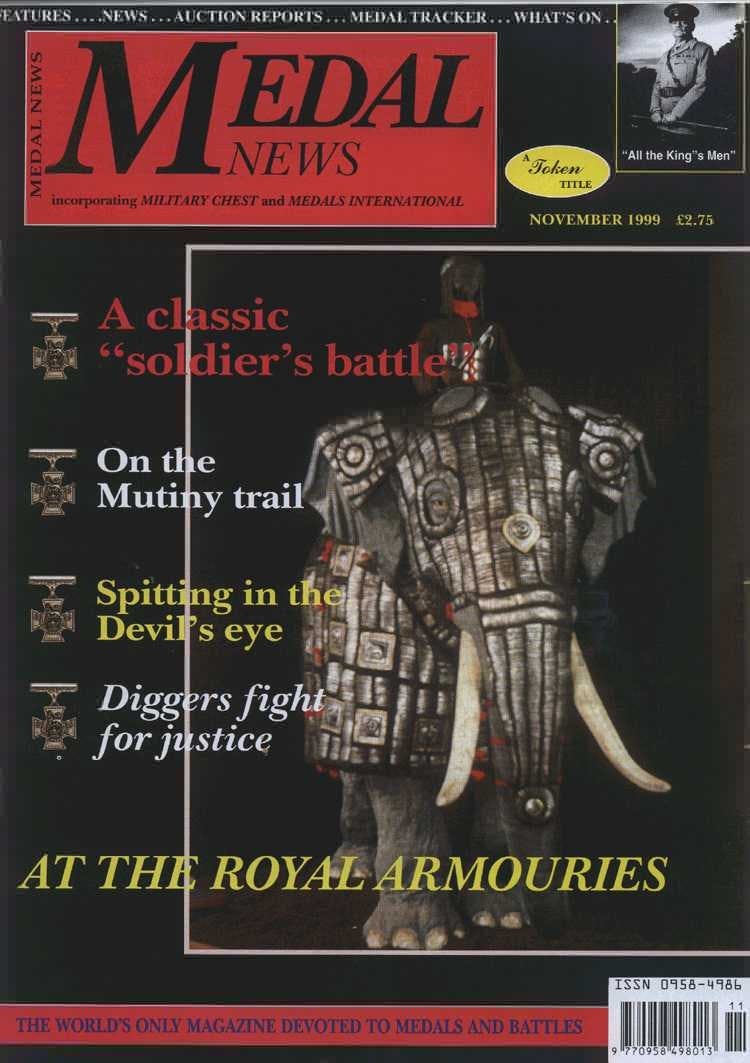From the Editorial desk - NO LONGER AVAILABLE
Volume 37, Number 10, November 1999
READERS may remember that some time ago I referred to an internet discussion group* on medals and medal collecting, and mentioned how interesting and relevant these discussions are. Another topic has recently surfaced, and has engendered a large amount of reaction: why are medals or groups to (usually fatal) casualties generally more expensive than those to non-casualties, and, by extension, why are casualty medals/groups more attractive to collectors? The comments made by various members of the discussion group have been extremely thoughtful and honest. The logical replies included the fact that medals to fatal casualties are scarcer that those to survivors (for most actions in British military history, anyway), so the price is simply reflecting supply and demand.of course, there are campaigns for which medals were awarded by definition only to survivors (Military General Service Medals, Waterloo Medals, Army of India Medals are the most obvious in this category, so there is no chance of finding a medal to a man killed at Albuera). Then there is the fact that the biographies of fatal casualties, particularly of world War I, are often better written up than those of survivors, and they are easier to trace through war memorials, rolls of honour and the like. Research is more rewarding, and has a finality about it when the date of death is known. For those with an interest in a particular action the fact that a serviceman died in that action proves that he was, indeed, present. If a sailor was killed at Jutland he was certainly on a ship that took part in the action. If a soldier was killed at Paardeberg he was certainly in a place in South Africa where being killed was a distinct possibility. It is possible that, although circumstantial evidence can point to the presence of an individual at a certain place and at a certain time (like the clasp on a medal), it is all too easy for the conditions under which a clasp was issued to allow virtual non-combatants to receive clasps when they may have been a long way from any action (witness the Balaklava clasp to the crimea Medal). However, I believe that the most perceptive comment made in the discussion was that there is no rationale to this activity we call medal-collecting. Different collectors collect the particular themes that givethem pleasure because they feel (and I use the word carefully) that this is what they want in their collection. There is something very powerful about the concept of giving one's life for one's country in war. War memorials remind all of us that death on the battlefield is no respecter of persons, and I find it intensely moving to read a dozen or so names on a village war memorial which covers ranks from colonel to Private and often include more than one serviceman of the same name. Most of us will probably never find ourselves in a position where the supreme sacrifice is even remotely likely, but many medal collectors derive their interest in collecting from their time in the armed forces, and I suspect that many have indeed faced this prospect and know the value of physical and moral courage involved. In some cases it is quite likely that the medal/group of a serviceman killed in action is the only physical item that remains that is personal to him. Thousands of young soldiers died childless, and when all family members who remember them have passed away, their memory may also fade. Personally I prefer to collect medal groups containing long service awards, or at least medals to regular soldiers who "did their time", recognising that they had another life outside the services, but for those young men whose lives were cut short this other life did not exist. Perhaps the medal collector who owns and treasures the medals of such a serviceman is the only person keeping his memory alive.
Order Back Issue
You can order this item as a back issue, simply click the button below to add it to your shopping basket.

